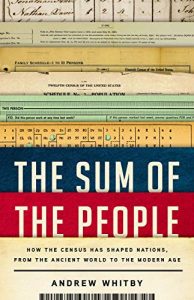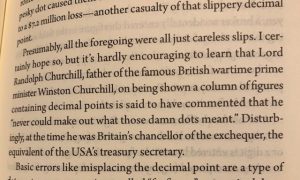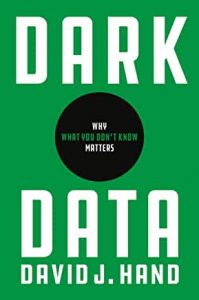One of my strands of work at the moment is thinking about data as a social asset, including how to value it. Anybody playing a word association game would probably link ‘personal’ with ‘data’, but the usefulness of any individual data record will generally depend on context – on other pieces of data. Information requires the combinations. What’s more, the way data is categorised and collected is highly socially structured too. If I buy a book online (it has been known), that datum will be classified in different ways to be useful, for the recommender algorithm or for marketing analytics: what genre? how much was the book? what else has she bought?
This is a preamble to this handy Primer on Powerful Numbers, a brief overview of the sociology of data with fantastic lists of references. It’s well worth a read. It sent me back after a long time to Benedict Anderson’s classic Imagined Communities, specifically the chapter ‘Census, Map, Museum’: “The real innovation of the census-takers of the 1870s was not in the construction of the ethnic-racial classifications but rather in their systematic quantification. …… The flow of subject populations through the mesh of differential schools, courts, clinics, police stations, immigration offices created ‘traffic habits’ which in time gave real social life to the state’s earlier fantasies.” On censuses, see also Andrew Whitby’s excellent history, The Sum of The People.
Census and map-making as social intstruments also feaure in Jürgen Osterhammel’s monumental The Transformation of the World: A Global History of the 19th Century, which I’ve recently been reading. I’m enjoying its woven approach – big themes as warp, teased out across the whole of the globe as weft, to paint a rich tapestry. One example relevant to data being shaped by society and in turn reshaping it is map-making, and the way physical maps in reflecting mental maps led to new actions (say in colonial administration) that in turn alter the physical maps – for example by tighter specification of borders as definitive lines (However, the book’s simply too big for me to hold, even in paperback, so I doubt I’ll get through it all. Given the big book trend, can I plead with publishers to return to the tradition of multiple volumes?)
 As we recognise ourselves to be in a data-driven economy and society, thinking about the social construction of data, the unavoidably social use of data, and the way data will alter the society it catalogues is vital. I’m lucky to have some amazing Bennett Institute colleagues thinking about these questions – Sam Gilbert’s Good Data, Jeni Tennison’s new project Connected by Data, Claire Melamed’s work on data for the SDGs, and Stephanie Diepeveen, Annabel Manley and Sumedha Deshmukh working with me on the value of data including specific applications (eg transport, finance).
As we recognise ourselves to be in a data-driven economy and society, thinking about the social construction of data, the unavoidably social use of data, and the way data will alter the society it catalogues is vital. I’m lucky to have some amazing Bennett Institute colleagues thinking about these questions – Sam Gilbert’s Good Data, Jeni Tennison’s new project Connected by Data, Claire Melamed’s work on data for the SDGs, and Stephanie Diepeveen, Annabel Manley and Sumedha Deshmukh working with me on the value of data including specific applications (eg transport, finance).




